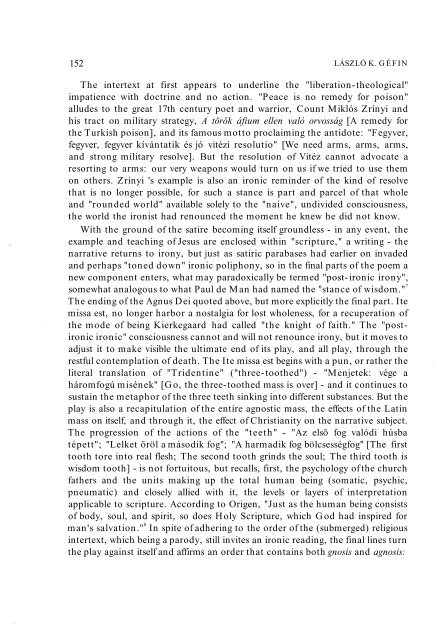152 LÁSZLÓ K. GÉFINThe intertext at first appears to underline the "liberation-theological"impatience with doctrine and no action. "Peace is no remedy for poison"alludes to the great 17th century poet and warrior, Count Miklós Zrínyi andhis tract on military strategy, A török áfium ellen való orvosság [A remedy forthe Turkish poison], and its famous motto proclaiming the antidote: "Fegyver,fegyver, fegyver kívántatik és jó vitézi resolutio" [We need arms, arms, arms,and strong military resolve]. But the resolution of Vitéz cannot advocate aresorting to arms: our very weapons would turn on us if we tried to use themon others. Zrínyi 's example is also an ironic reminder of the kind of resolvethat is no longer possible, for such a stance is part and parcel of that wholeand "rounded world" available solely to the "naive", undivided consciousness,the world the ironist had renounced the moment he knew he did not know.With the ground of the satire becoming itself groundless - in any event, theexample and teaching of Jesus are enclosed within "scripture," a writing - thenarrative returns to irony, but just as satiric parabases had earlier on invadedand perhaps "toned down" ironic poliphony, so in the final parts of the poem anew component enters, what may paradoxically be termed "post-ironic irony",somewhat analogous to what Paul de Man had named the "stance of wisdom." 7The ending of the Agnus Dei quoted above, but more explicitly the final part. Itemissa est, no longer harbor a nostalgia for lost wholeness, for a recuperation ofthe mode of being Kierkegaard had called "the knight of faith." The "postironicironic" consciousness cannot and will not renounce irony, but it moves toadjust it to make visible the ultimate end of its play, and all play, through therestful contemplation of death. The Ite missa est begins with a pun, or rather theliteral translation of "Tridentine" ("three-toothed") - "Menjetek: vége aháromfogú misének" [Go, the three-toothed mass is over] - and it continues tosustain the metaphor of the three teeth sinking into different substances. But theplay is also a recapitulation of the entire agnostic mass, the effects of the Latinmass on itself, and through it, the effect of Christianity on the narrative subject.The progression of the actions of the "teeth" - "Az első fog valódi húsbatépett"; "Lelket őröl a második fog"; "A harmadik fog bölcsességfog" [The firsttooth tore into real flesh; The second tooth grinds the soul; The third tooth iswisdom tooth] - is not fortuitous, but recalls, first, the psychology of the churchfathers and the units making up the total human being (somatic, psychic,pneumatic) and closely allied with it, the levels or layers of interpretationapplicable to scripture. According to Origen, "Just as the human being consistsof body, soul, and spirit, so does Holy Scripture, which God had inspired forman's salvation." 8 In spite of adhering to the order of the (submerged) religiousintertext, which being a parody, still invites an ironic reading, the final lines turnthe play against itself and affirms an order that contains both gnosis and agnosis:
THE AGON OF IRONY AND SATIREA harmadik fog bölcsességfogállkapcsunkban későn virágzik(fogósdit játszunk acélfogóval)és zsibbadunk. Elegáns injekcióvalmár az örökös fájdalom partja se látszik.[The third tooth is wisdom toothit blooms late in our jaw(we play catch with steel pliers)and go numb. An elegant needlemakes invisible the shores of eternal pain].The figurai language is very compact, but it is not needlessly cryptic, nor is it afull return to irony. The play of catch is the play of life and death; only wehumans know what is at stake in this play, yet we still play on. The "elegantneedle" is properly both literal and allegorical: the former is the needle of goodand easy death; the latter, the injection of some artful evasion of death such asgood writing that momentarily dissolves the true world of pain and sorrow. Butbeing in the "stance of wisdom," the post-ironic subject now knows literal andfigurai to be one, and is able to stand both inside and outside, for it, as de Manwrites, "however painful, sees things as they actually are." 9 If Missa agnostica isan "orphan" text, as postulated above, it is because its narrating subject acceptshis own orphanhood, acknowledging as distant kin only the Kierkegaardian"knight of infinite resignation." But orphans, like the Jesus Anguillos of theworld with whom the narrator has shown solidarity, can also play; thewhimpering picture is not the whole picture. Play is available to the adult orphanas well, especially as he had orphaned himself when he chose to follow the roadof his docta ignorantia wherever it took him. The entry of post-ironic irony doesnot inject a lugubrious tone into Vitéz' text; quite the contrary: as in Yeats'Lapis Lazuli, the gaiety and enormous tragic fun of free play still transfigures allthat dread. And the agnostic mass still remains a mass, celebrating the rites ofplay against ennui and bad faith, while quietly acknowledging the "shores ofeternal pain" as its ultimately impassable bounderies.<strong>No</strong>tes<strong>1.</strong> References throughout this paper are to Missa agnostica (Paris: <strong>Magyar</strong> Műhely, 1979). Thepoem also appears in Vitéz's collected poems, Az ájtatos manó imája (Szombathely: Életünkkönyvek, 1991) 125-164.2. Jacques Derrida, "Living on/Border Lines" in Harold Bloom, Deconstruction and Criticism(New York, 1979), 83.
- Page 1 and 2:
Papers of the Radnóti Memorial Con
- Page 3:
HUNGARIAN STUDIESVOLUME 11, 1996 CO
- Page 8 and 9:
6 GEORGE GÖMÖRIprobably Fürst an
- Page 10 and 11:
8 GEORGE GÖMÖRIof the utmost impo
- Page 12 and 13:
10 GEORGE GÖMÖRIén e földön...
- Page 14 and 15:
12 GEORGE GÖMÖRINotes1. Miklós R
- Page 16 and 17:
14 MIHÁLY SZEGEDY-MASZÁKself alwa
- Page 18 and 19:
16 MIHÁLY SZEGEDY-MASZÁKtype is r
- Page 20 and 21:
18 MIHÁLY SZEGEDY-MASZÁKpose, the
- Page 22 and 23:
20 MIHÁLY SZEGEDY-MASZÁK"Wozu Dic
- Page 24 and 25:
22 MIHÁLY SZEGEDY-MASZÁKand Wilme
- Page 26 and 27:
24 MIHÁLY SZEGEDY-MASZÁKbeen the
- Page 28 and 29:
26 MIHÁLY SZEGEDY-MASZÁKBolond, k
- Page 30 and 31:
28 MIHÁLY SZEGEDY-MASZÁK6. Emery
- Page 32 and 33:
30 ZSUZSANNA OZSVÁTHand breaks as
- Page 34 and 35:
32 ZSUZSANNA OZSVÁTHThe drama echo
- Page 36:
34 ZSUZSANNA OZSVÁTHcontinents at
- Page 39 and 40:
FROM CAIN TO NAHUM 37which, as Csap
- Page 41 and 42:
\FROM CAIN TO NAHUM 39and bears and
- Page 43 and 44:
FROM CAIN TO NAHUM 41who sees what
- Page 45 and 46:
FROM CAIN TO NAHUM 438. "A félelme
- Page 47 and 48:
HELP ME, PASTORAL MUSE:THE VIRGELIA
- Page 49 and 50:
HELP ME, PASTORAL MUSE 47compete! W
- Page 51 and 52:
HELP ME, PASTORAL MUSE 49of a priva
- Page 53 and 54:
HELP ME, PASTORAL MUSE 51Once again
- Page 55 and 56:
HELP ME, PASTORAL MUSE 53Eighth Ecl
- Page 57 and 58:
HELP ME, PASTORAL MUSE 55have that
- Page 59:
HELP ME, PASTORAL MUSE 57Paul de Ma
- Page 62 and 63:
60 SAMUEL J. WILSONWe did, however,
- Page 64 and 65:
62 SAMUEL J. WILSONbeings and contr
- Page 66 and 67:
64 SAMUEL J. WILSONHungarians would
- Page 68 and 69:
66 SAMUEL J. WILSONthe Austrians. G
- Page 70 and 71:
68 SAMUEL J. WILSONnorth-eastern Zi
- Page 72 and 73:
70 SAMUEL J. WILSONoriginally pursu
- Page 74 and 75:
72 SAMUEL J. WILSONGörgey's decisi
- Page 76 and 77:
74 SAMUEL J. WILSONfrom occurring,
- Page 78 and 79:
76 SAMUEL J. WILSON8. Artúr Görge
- Page 80 and 81:
78 STEVEN TÖTÖSY de ZEPETNEKtört
- Page 82 and 83:
80 STEVEN TÖTÖSY de ZEPETNEKThe c
- Page 84 and 85:
82 STEVEN TÖTÖSY de ZEPETNEKher u
- Page 86 and 87:
84 STEVEN TÖTÖSY de ZEPETNEKthe b
- Page 88 and 89:
86 STEVEN TÖTÖSY de ZEPETNEKrooti
- Page 90 and 91:
88 STEVEN TÖTÖSY de ZEPETNEKcriti
- Page 92 and 93:
90 STEVEN TÖTÖSY de ZEPETNEK'My f
- Page 94 and 95:
92 STEVEN TÖTÖSY de ZEPETNEKshe d
- Page 96 and 97:
94 STEVEN TÖTÖSY de ZEPETNEKNotes
- Page 99 and 100:
BERLIN ET PARIS DE LAJOS TIHANYIVAL
- Page 101 and 102:
BERLIN ET PARIS DE LAJOS TIHANYI 99
- Page 103 and 104: BERLIN ET PARIS DE LAJOS TIHANYI 10
- Page 105 and 106: BERLIN ET PARIS DE LAJOS TIHANYI 10
- Page 107 and 108: BERLIN ET PARIS DE LAJOS TIHANYI 10
- Page 109 and 110: BERLIN ET PARIS DE LAJOS TIHANYI 10
- Page 111 and 112: BERLIN ET PARIS DE LAJOS TIHANYI 10
- Page 113 and 114: BERLIN ET PARIS DE LAJOS TIHANYI 11
- Page 115: BERLIN ET PARIS DE LAJOS TIHANYI 11
- Page 118 and 119: 116 KEVIN E. KELLYfilms Lugosi made
- Page 120 and 121: 118 KEVIN E. KELLYthe provinces, no
- Page 122 and 123: 120 KEVIN E. KELLYWith his brief an
- Page 124 and 125: 122 KEVIN E. KELLYboth his and Dean
- Page 126 and 127: 124 KEVIN E. KELLYfollowed it into
- Page 128 and 129: 126 KEVIN E. KELLYvampiric nobleman
- Page 130 and 131: 128 KEVIN E. KELLYThe film also boo
- Page 132 and 133: 130 KEVIN E. KELLYWood remained one
- Page 134 and 135: 132 KEVIN E. KELLYLugosi, convinced
- Page 136 and 137: 134 KEVIN E. KELLY19. Lennig, 112-1
- Page 139 and 140: THE AGON OF IRONY AND SATIREIN GYÖ
- Page 141 and 142: THE AGON OF IRONY AND SATIRE 139poe
- Page 143 and 144: THE AGON OF IRONY AND SATIRE 141tra
- Page 145 and 146: THE AGON OF IRONY AND SATIRE 143fek
- Page 147 and 148: THE AGON OF IRONY AND SATIRE 145ner
- Page 149 and 150: THE AGON OF IRONY AND SATIRE 147whi
- Page 151 and 152: THE AGON OF IRONY AND SATIRE 149mov
- Page 153: THE AGON OF IRONY AND SATIRE 151for
- Page 157 and 158: MURDER IN THE MOUNTAINSTranslated b
- Page 159 and 160: MURDER IN THE MOUNTAINS 157"Afraid?
- Page 161 and 162: MURDER IN THE MOUNTAINS 159Abády,
- Page 163 and 164: MURDER IN THE MOUNTAINS 161"The mar
- Page 165 and 166: MURDER IN THE MOUNTAINS 163Bálint
- Page 167 and 168: MURDER IN THE MOUNTAINS 165"That is
- Page 169 and 170: MURDER IN THE MOUNTAINS 167at hand,
- Page 171 and 172: CONTRIBUTORSMiklós BÁNFFYLászló
















